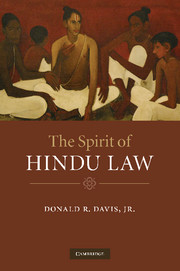Book contents
- Frontmatter
- Contents
- List of tables
- Preface
- Acknowledgments
- List of abbreviations
- Introduction (dharmaśāstra)
- 1 Sources and theologies (pramāṇa)
- 2 Hermeneutics and ethics (mīmāṃsā)
- 3 Debt and meaning (ṛṇa)
- 4 Persons and things (svatva)
- 5 Doubts and disputes (vyavahāra)
- 6 Rectitude and rehabilitation (daṇḍa)
- 7 Law and practice (ācāra)
- Conclusion
- Bibliography
- Index
1 - Sources and theologies (pramāṇa)
Published online by Cambridge University Press: 26 February 2010
- Frontmatter
- Contents
- List of tables
- Preface
- Acknowledgments
- List of abbreviations
- Introduction (dharmaśāstra)
- 1 Sources and theologies (pramāṇa)
- 2 Hermeneutics and ethics (mīmāṃsā)
- 3 Debt and meaning (ṛṇa)
- 4 Persons and things (svatva)
- 5 Doubts and disputes (vyavahāra)
- 6 Rectitude and rehabilitation (daṇḍa)
- 7 Law and practice (ācāra)
- Conclusion
- Bibliography
- Index
Summary
One of the most common and best ways to get an initial sense of a system of law is to examine the sources of law taken as authoritative in that system. Sources of legal authority speak to both the religious and social foundations of the law. In most legal traditions, the sources of law can usually be categorized in terms of morality, politics, and history or universal, legislative, and traditional rules, respectively. The priority given to one of these or their balance differentiates legal systems from each other and also distinguishes periods of their internal history. Hindu law is no exception to this scheme, though, of course, the particular emphases given and how each source of law is described and conceived relate to the history of law in India and the development of Hinduism. In the case of Hindu law, the de-emphasis on legislation and the commands of political rulers strikes the modern reader as its distinctive characteristic. This relative lack of legislative rules, however, emerges in part from the fact that Hindu jurisprudence names the household, and not the state, as the primary institutional location of law. More broadly, we can say that the Hindu legal tradition maintains that the main authority over, and responsibility for, law occurs at the level of community, not state polity, and that the paradigmatic community is the household or the family, especially the household of an educated Brahmin male.
- Type
- Chapter
- Information
- The Spirit of Hindu Law , pp. 25 - 46Publisher: Cambridge University PressPrint publication year: 2010



